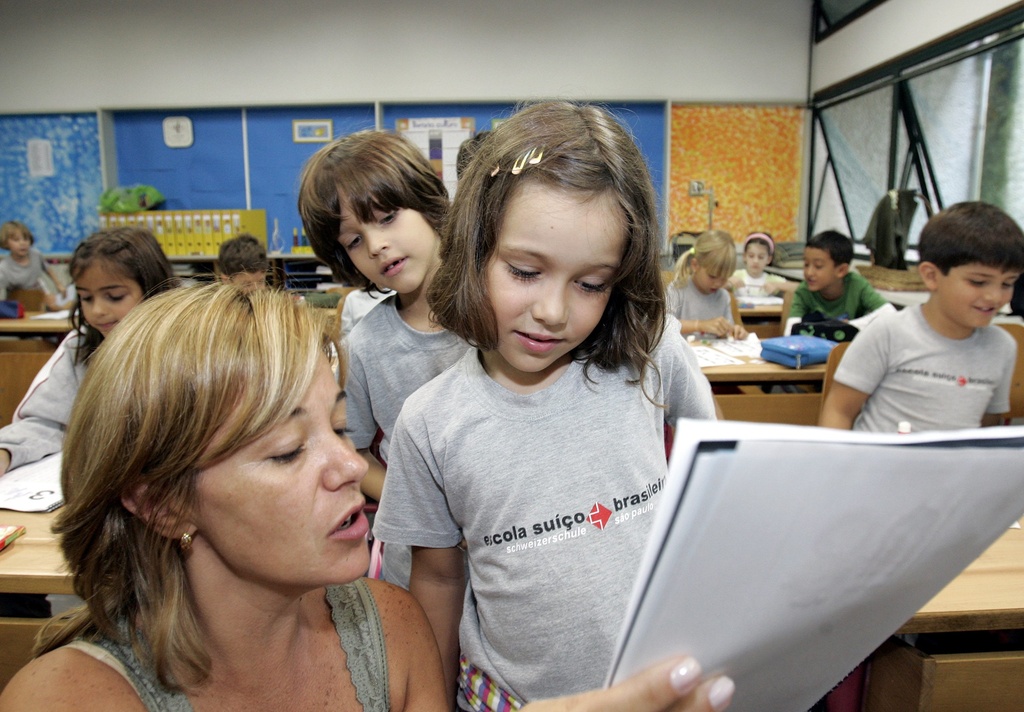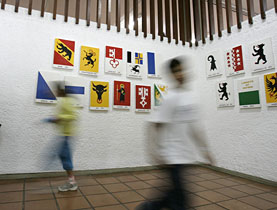Teaching Swiss values abroad

Swiss schools abroad are an important way of transmitting Swiss culture around the world, but they are facing new challenges, particularly over expansion plans.
These were some of the conclusions drawn at the annual Swiss schools abroad congress, which represents 17 establishments in Europe, Asia, Africa and South America. The meeting was held in Chur in the eastern canton of Graubünden.
“Swiss schools abroad play a fundamental role in Switzerland’s presence worldwide and have contributed to reinforcing the country’s image,” said parliamentarian Brigitta Gadient, one of the speakers at the two-day conference, which has just ended.
“They have the distinctive feature of offering bilingual teaching. The establishment of Swiss schools abroad has even led to improvements in education in countries including Spain and Italy,” she added.
Originally founded to allow children of Swiss expatriates to keep a link with their native country, Swiss schools abroad are currently facing a changed situation.
Globalisation and the opening of emerging markets have led to calls for more schools.
“Various entrepreneurs wonder why new schools aren’t built in India, China or Russia, countries where Swiss companies are more and more present,” Gadient explained.
But some delegates pointed out that the survival of schools which already exist has to be considered before any expansion plans can be envisaged.
The Swiss government is looking to cut costs in this area. It has put forward three proposals for amending the law on the promotion of the education of young Swiss abroad.
“The current law must certainly be revised, partly because it doesn’t allow for the opening of new schools,” said Robert Engeler, chairman to the school board of governors of the Swiss school in Milan in Italy. “If we want to make an impact in emerging countries, we must work on the law.”
Cultural considerations
According to Jean-Frédéric Jauslin, director of the Federal Culture Office which oversees Swiss schools abroad, it is important to define new and clear objectives when revising the law – especially in the cultural field.
“Unlike Austrian or German institutions abroad the aim of Swiss schools abroad is not to defend German or any other national language. Their aim is to present Switzerland and its values,” Jauslin told swissinfo.ch.
“For me, the cultural aspect is important: Switzerland is known for its banks and chocolate, but not for its culture. Yet I am convinced that Swiss schools abroad can contribute towards presenting Switzerland’s rich culture.”
“Besides, Switzerland invests more money per inhabitant in culture than France or Germany,” he added.
Jauslin believes it is necessary to have a long-term vision. This would involve following the motion filed by centre-right Christian Democrat parliamentarian Pius Segmüller, which calls for funding for Swiss schools abroad to be on a quadrennial basis rather than on an annual basis, as it is now.
Joining forces
The meeting was also a good opportunity to look at the situation in individual countries, including Brazil.
A merger of schools in Curitiba (540 students) and Sao Paulo (660), has resulted in increased collaboration on many different levels, from teaching to administration, explained Bernhard Beutler, head of the Sao Paulo school.
“There are both small schools, but by joining forces, we can now count on a better position in the market,” he said.
Beutler insisted that the objective was not to cut costs, but to improve quality. “But, obviously by sharing resources you can also save some money.”
Luigi Jorio, swissinfo.ch (Translated from Italian by Emily Wright)
There are 17 Swiss schools abroad in Europe, Africa, Asia and South America.
They have 6,570 students, 1,800 of which are Swiss citizens. There are about 500 teachers.
The law fixes a minimum proportion of Swiss students: 30 per cent in the small schools, 20 in the bigger ones.
Swiss schools were affected by cutbacks, which increased school fees and caused reductions in teachers’ salaries.
In 2008 parliament went against the government’s advice and decided to increase the credit for Swiss schools abroad from SFr15 million ($14.15 million) to SFr20 million.
In 2009 the Federal Culture Office gave a subsidy of just under SFr17 million.
The schools are also supported by one or more cantonal partners.
The government has put forward three proposals to amend the current law on the promotion of the education of young Swiss abroad.
The first one foresees stopping all government funding, while the second wants to reduce the current subsidy of SFr20 million.
A third scenario, favoured by the government, would improve the current schools promotion strategy, without reducing the subsidy. The Senate has already come out in support of this model.

In compliance with the JTI standards
More: SWI swissinfo.ch certified by the Journalism Trust Initiative













You can find an overview of ongoing debates with our journalists here . Please join us!
If you want to start a conversation about a topic raised in this article or want to report factual errors, email us at english@swissinfo.ch.